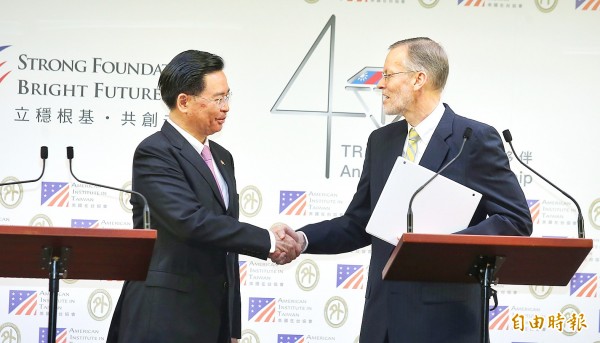《TAIPEI TIMES》 Taiwan, US to hold annual dialogue

Minister of Foreign Affairs Joseph Wu, left, and American Institute in Taiwan Director Brent Christensen shake hands at a news conference at the ministry in Taipei yesterday, as Taiwan and the US launch a new dialogue mechanism called “Indo-Pacific Democratic Governance Consultations.” Photo: Liu Hsin-de, Taipei Times
DEMOCRATIC GOVERNANCE: The first meeting is expected to be held in September, with a senior US State Department official leading a delegation to Taipei
By Stacy Hsu / Staff reporter
Taiwan and the US yesterday announced the establishment of an annual dialogue mechanism on democratic governance in the Indo-Pacific region, which would serve as a regular occasion for both sides to explore ways to assist other countries in the area in addressing governance challenges.
The creation of the Indo-Pacific Democratic Governance Consultations was announced by Minister of Foreign Affairs Joseph Wu (吳釗燮) and American Institute in Taiwan (AIT) Director Brent Christensen in a rare joint appearance at a news conference at the ministry in Taipei.
Good governance is one of the three pillars of the Indo-Pacific strategy of US President Donald Trump’s administration, Christensen said in his speech.
“The US and Taiwan share the belief that advancing transparency and rule of law in the region in turn contributes to the goal of a free, open and prosperous Indo-Pacific region,” he said, adding that the common conviction that all people deserve fundamental freedoms has served as an important basis for Washington’s partnership with Taipei.
The annual dialogue is to be held in either of the two nations on a rotational basis, with the first one expected to take place in September in Taipei, with a delegation led by a senior official from the US Department of State’s Bureau of Democracy, Human Rights and Labor attending, Christensen said.
The goal is for both sides to explore ways to increase bilateral cooperation and pursue joint projects in the region that assist other countries in addressing the governance challenges of the day, he said.
Wu said the annual meetings would not only involve government officials from Taiwan and the US, as officials from other countries in the region would also be invited to make a contribution.
“As I said in a speech at the Los Angeles World Affairs Council last week, authoritarian regimes and illiberal populist movements have been attacking democracies. A smokeless ideological war is happening around us right now,” Wu said.
Taiwan has been on the front line of defending democracy and freedom, Wu said, adding that the government and its people have not only endeavored to safeguard their own democratic achievements, but are also willing to contribute to the world, and help defend the international order and universal values.
As the creation of the consultative mechanism coincides with a year-long celebration by both sides to mark the 40th anniversary of the US’ Taiwan Relations Act, it marks an important milestone for Taiwan-US cooperation on promoting shared values of democracy and freedom, he said.
Asked whether the mechanism was established as a signal to China that it should do things differently, Christensen said it was not created to provoke Beijing.
The initiatives that the US takes with Taiwan should be interpreted as just that, he said, adding that the China factor should be a separate issue.
A Taiwanese official, who requested anonymity, said the idea of creating a democratic governance consultative mechanism was proposed by US Bureau of Democracy, Human Rights and Labor Deputy Assistant Secretary Scott Busby during his visit to Taiwan in October last year.
While Taiwan and the US already enjoy many dialogue mechanisms — including on security — most of them cannot be made public, the official said.
“That was why the [Taiwanese] government was delighted to learn of Washington’s decision to publicly announce the creation of the new democracy governance consultation mechanism,” he said.
新聞來源:TAIPEI TIMES
%http://www.taipeitimes.com/















